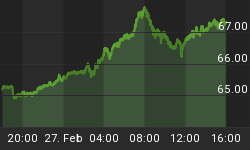I have written numerous times on the consequences of the Fed's loose monetary policy and how it can aggravate the current account deficit. Until recently figures confirmed my worst fears that the current account was racing along unabated. But what else should one expect given the monetary boom that the Fed unleashed. Now the actual CAD figures don't matter -- what matters is the trend and the reason for it. The reason has already been established and is now monetary history.
However, it now appears that the CAD might start to shrink as US exports expand. Nothing surprising here. It is an established fact that when a country's currency depreciates its exports will expand because their prices are falling in terms of other currencies. As economists say: the terms of trade have now turned against the US economy. In plain English this means that That the US will have to export more if Americans want to maintain their current consumption of foreign-made consumer goods. (This is called the J-curve effect).
But this in no way vitiates my previous arguments with respect to the CAD being fuelled by the Fed's loose monetary policy. What is being missed is the international consequences of this policy. Sometime ago Greenspan warned that excessive domestic demand could not continue to indefinitely absorb increasing quantities of imports. This was a clear admission on his part that monetary policy is the real villain and not the American consumer. Greenspan was not alone in his thinking. When he was governor of the Reserve Bank of Australia Bernie Fraser stated:
If demand runs ahead of capacity, it will spill over into imports and widen the current account deficit (CAD). This is what happened in 1989-90 when the deficit reached 6 per cent of GDP. On this occasion the CAD is not expected to increase to the very high levels reached during the lat 1980s. (Reserve Bank Annual Report, 1994).
Despite this dismal monetary picture the US Treasury still argues -- as does the Australian Treasury -- that cheap imports have helped hold down inflation. And it is this import/inflation argument that brings us to the heart of this matter. I have stressed in previous articles that loose monetary policies create malinvestments that eventually emerge as 'excess investment' and rising unemployment. Unfortunately this fact is scarcely understood and rarely discussed in public. If it were then the reasoning would be readily extended to imports.
The US has generated 'excess demand', i.e., it implemented an inflationary policy. Eventually the CAD started to deteriorate as the economy starts sucking in more imports. But imports do not come from Santa's workshop. They are produced by foreign firms which have responded to increased US demand by directing production away from domestic demand. The longer the US persisted with an inflationary policy that directs foreign production toward satisfying US demand the greater will be foreign malinvestments.
As these firms and industries become more dependent on exporting to the US they will absorb more and more capital and labour, directing them away from domestic use. America's record CAD makes this an indisputable fact. But this analysis leads to the conclusion that rather than holding inflation in check, rising imports really indicate that the US has been exporting its inflation to its trading partners. So even if these exporting countries do not allow dollar imports to expand their money supplies, as was the case with Eurodollars, they will still accumulate malinvestments. When the monetary brakes are finally applied American industries will not be the only ones to suffer*.
It's impossible to say to what extent exporting countries will suffer or even which countries will suffer the most. But we can say that any country with a poor history of political stability might well find itself sorely tested if a significant number of its industries have come to depend on US demand for their prosperity. Such countries cannot afford to have hundreds of thousands put out of work, which might happen if America's demand for imports were to plunge.
Naturally, that government intervention in the market place in the form of a criminally loose monetary policy is the real destabilising factor behind crises in international trade is not something that is generally recognised -- thanks to Keynesian thinking. Just as naturally, when the crisis emerges it will be capitalism, not meddling governments, that will get the blame. It will be no different in the US.
This monetary view of the current account deficit is based on the fact that money is not neutral, meaning that increasing the money supply distorts the price structure, a phenomenon that was discussed by a number of classical economists. These discussions took place within the framework of gold standard and the consequences of paper money on the exchange rate and trade.
Therefore it shows why it was ridiculous for Mr Des Moore to dismiss my argument, as he did, on the grounds that it is not within the "traditional explanation". If anyone has doubts about this matter allow me draw your attention to Joseph Schumpeter's observation that "the 'classical' writers without neglecting other cases, reasoned primarily in terms of an unfettered international gold standard". (The History of Economic Analysis, Oxford University Press, 1994, p. 732).















